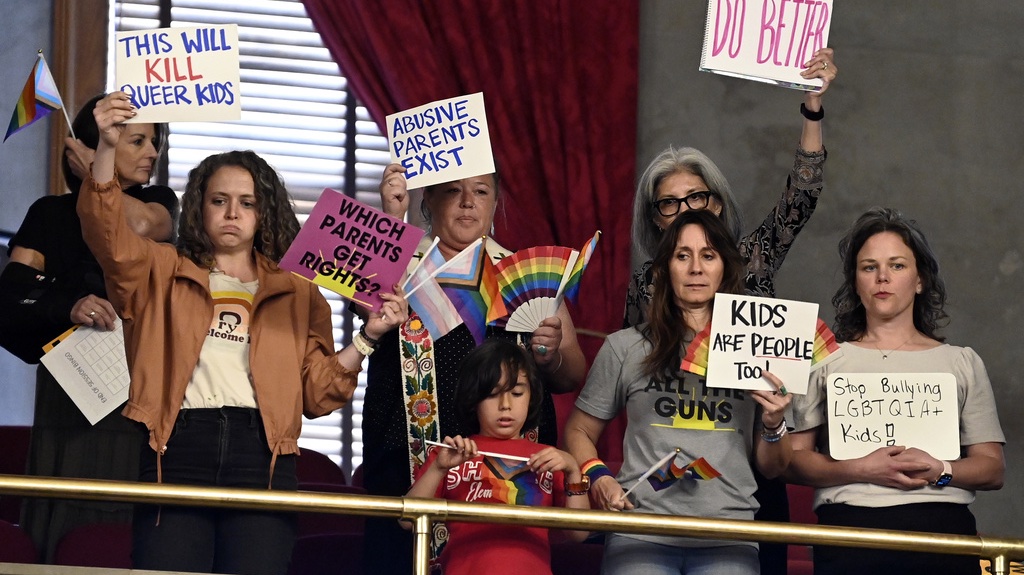May 4, 2012
Ugandan Gay Activist Speaks at Georgetown
Michael K. Lavers READ TIME: 3 MIN.
Ugandan gay activist Frank Mugisha discussed the plight of LGBT people in his East African homeland during an appearance at Georgetown University in Washington, D.C., on Monday.
The executive director of Sexual Minorities Uganda who received the 2011 Robert F. Kennedy Human Rights Award from the Robert F. Kennedy Center for Justice and Human Rights last November spoke at length about the so-called Anti-Homosexuality Bill that Parliamentarian David Bahati introduced in 2009. The provision that would have imposed the death penalty upon anyone found guilty of repeated same-sex sexual acts has since been removed, but the measure itself has been reintroduced.
"When the bill was introduced in the Parliament of Uganda, we were not expecting such an extreme legislation," said Mugisha, who once again blamed American evangelicals for stoking anti-LGBT sentiments in the country before Bahati introduced the bill. "As we tried to survive and ask the Ugandans to let us live in peace, there was a force and there was another organized group that was out to challenge our own humanity and our own living."
This homophobia has often manifested itself in violence against LGBT Ugandans.
David Kato, who was SMUG's then-advocacy and litigation officer, was beaten to death in his Kampala home in Jan. 2011 after a tabloid published his name and home address. Both President Barack Obama and Secretary of State Hillary Clinton urged Ugandan authorities to investigate the crime. A judge last November sentenced Nsubuga "Enock" Sydney to 30 years in prison for the crime.
"In my country, we are talking about homophobia," said Mugisha, framing the persecution of LGBT Ugandans as a human rights issue. He stressed that this homophobia has not only prevented them from working or going to school, but has left them particularly susceptible to violence. "If I'm doing something that's not hurting someone, then it is my right to do it. If I'm doing something that is hurting someone, then maybe that's when we need to draw the line and bring in the rule of law. My sexual orientation does not hurt anyone."
The White House in December released a presidential memorandum that directed agencies that carry out American foreign policy to promote LGBT rights. Clinton said during a speech she delivered almost simultaneously at the United Nations in Geneva that gay rights are synonymous with human rights.
British Prime Minister David Cameron suggested last fall that his government would cut aid to countries that continue to criminalize homosexuality and deny legal protections to their LGBT citizens.
Is this strategy effective?
Ugandan President Yoweri Museveni, who told CNN's Christiane Amanpour last month that nobody has been killed in his country because of their sexual orientation, is among the African leaders who criticized Obama and Cameron over their foreign aid comments. Mugisha described the British prime minister's suggestion to Boy in Bushwick immediately after he spoke at Georgetown as somewhat "counterproductive to our movement" because the Ugandan media interpreted it as a former colonial power's attempt to interfere with the country's affairs. He was quick to stress, however, that he very much welcomed the content of Clinton's speech.
As donor countries continue to debate the allocation of foreign aid based on a recipient's LGBT rights record, Mugisha and his group have taken their fight to the courts.
SMUG accused American evangelical Scott Lively of violating international law in a lawsuit it filed in a Massachusetts federal court in March. The group specifically claims that the leader of the "ex-gay" movement conspired with Ugandan political and religious leaders to implement strategies that exacerbated homophobic attitudes in the East African country. SMUG's lawsuit also documents Lively's 2009 statements that compared Ugandan LGBT activists to Nazis and those who participated in the 1994 genocide in neighboring Rwanda.
"The issue of the case was to highlight his [Lively's] homophobic behavior," said Mugisha. "The role is for us to show his corruption leads to this homophobic behavior."
In spite of the systemic challenges that LGBT Ugandans continue to face, Mugisha remains characteristically hopeful about the future. He noted the support SMUG has received from Uganda's civil society and even some parliamentarians have given him glimmers of hope.
"I'm seeing the small changes," said Mugisha. "Right now I'm seeing the change. I cannot say that there's no progress."
Based in Washington, D.C., Michael K. Lavers has appeared in the New York Times, BBC, WNYC, Huffington Post, Village Voice, Advocate and other mainstream and LGBT media outlets. He is an unapologetic political junkie who thoroughly enjoys living inside the Beltway.


